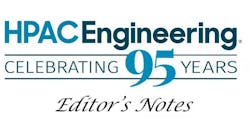In an attempt to facilitate the sharing of experiences, best practices, and resources within the building-energy-codes community, the Building Codes Assistant Project (BCAP) — an initiative of the Alliance to Save Energy, the Natural Resources Defense Council, and the American Council for an Energy-Efficient Economy — has launched the “Ten Places to Watch in 2010” campaign, recognizing states and localities demonstrating true commitment to energy-efficient buildings.
Cities and states gain recognition from the BCAP by such actions as adopting the latest versions of the International Energy Conservation Code (IECC) and ANSI/ASHRAE/IESNA Standard 90.1, Energy Standard for Buildings Except Low-Rise Residential Buildings; providing compliance training; running enforcement programs; and promoting above-code innovation.
So far, nine of the 10 places have been selected. They are:
-
Austin, Texas, chosen for commissioning, residential testing, and model-energy-code adoption.
-
Georgia, chosen for model-energy-code adoption, training, and third-party inspections.
-
Idaho, chosen for model-energy-code adoption, the Idaho Energy Code Collaborative, and statewide implementation strategies.
-
Kansas, chosen for commissioning, residential testing, and model-energy-code adoption.
-
Massachusetts, chosen for IECC 2009 training, its residential-building “stretch code,” and community grant programs.
-
New Hampshire, chosen for model-energy-code adoption and its roadmap for meeting the 90-percent-compliance-by-2017 requirement in the American Recovery and Reinvestment Act of 2009.
-
New York City, chosen for “greener, greater building laws” and the Green Codes Task Force.
-
Rifle, Colo., chosen for training, model-energy-code adoption, and municipal outreach.
-
Santa Fe, N.M., chosen for its Residential Green Building Code, citywide sustainability plan, and water conservation.
For more information, visit www.bcap-ocean.org/tenplaces.








